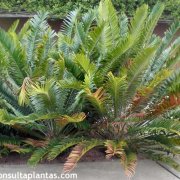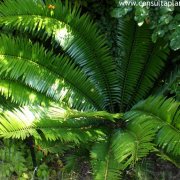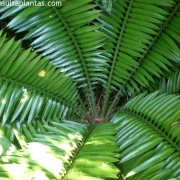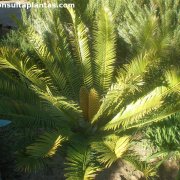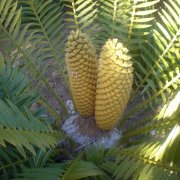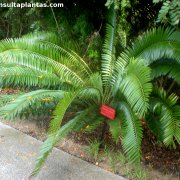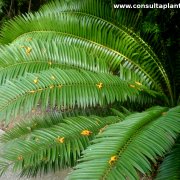Care of the cycad Encephalartos senticosus or Jozini cycad |
|
The genus Encephalartos, family Zamiaceae, comprises 60 species of cycads native to Africa. Some species are: Encephalartos senticosus, Encephalartos natalensis, Encephalartos lebomboensis, Encephalartos horridus, Encephalartos ferox, Encephalartos altensteinii, Encephalartos villosus, Encephalartos lehmannii, Encephalartos transvenosus, Encephalartos aemulans, Encephalartos paucidentatus. Common names: Jozini cycad, Spiny Leafed Cycad. This species is native to Mozambique and South Africa. They are dioecious plants of relatively fast growth that reach 4 meters (13.12 feet) in height. The leaves (follicles) are dark green and ovate in shape with serrated edges. They produce male and female cones. Jozini cycad is used in small groups of 2-3 plants and as isolated specimens. It's suitable for growing in pots. Encephalartos senticosus can be grown in full sun or semi-shade exposures. It resists frost down to -5 ºC (23 ºF). The most important thing is that the soil is very well drained. Jozini cycad can grow in stony and sandy soils but are welcome to contain leaf mulch. The pot transplant is done in early spring if the roots appear at the base of the pot. Water moderately throughout the year (they resist drought well) waiting for the substrate to dry well. In summer increase the waterings (especially in Mediterranean climate) to 2 times a week. Encephalartos senticosus does not need pruning. Spiny Leafed Cycad is a plant resistant to pests and diseases but sensitive to excess humidity. Propagation is a very slow process because the seeds can take 1 year to germinate. Sometimes the plant produces suckers that can be separated for propagation. |
Images of the cycad Encephalartos senticosus or Jozini cycad |
Find plants
Encephalartos senticosus or Jozini cycad | Care and Growing
© 2025 FavThemes
